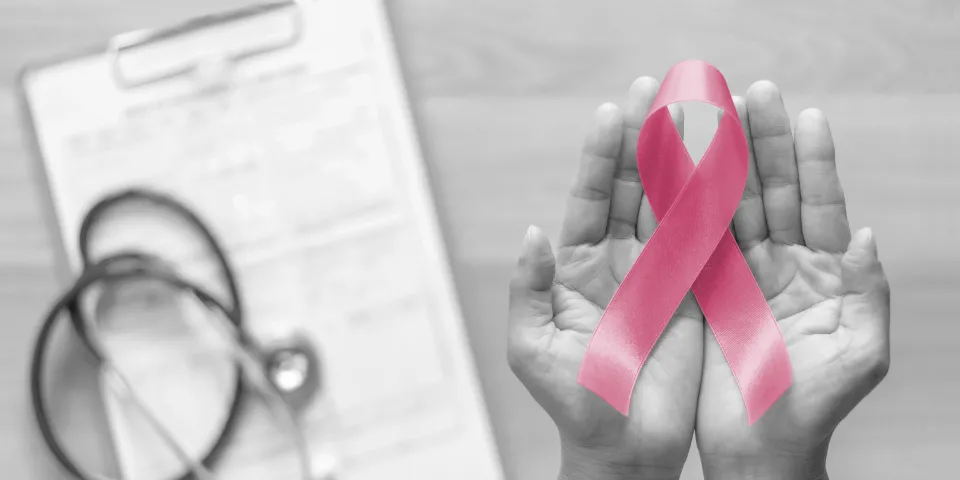Latest
Supporting Women in the Fight Against Breast Cancer: The Essential Role of Women’s Health Nurse Practitioners
Oct 29, 2024

Pink ribbons, pink parades, even pink football cleats—every October, the world seems to turn pink. This vibrant color has become a recognizable symbol of strength, hope, and unity in the fight against breast cancer. Why?
Breast cancer is the most common cancer diagnosed among women in the United States, according to the American Cancer Society. With 1 in 8 women facing a breast cancer diagnosis at some point in their lives, nearly everyone knows someone who has been affected—whether it’s a friend, family member, or themselves.
This shared experience highlights just how important it is to prioritize breast health and connect with healthcare providers who specialize in women’s health. Women’s health nurse practitioners (WHNPs) are a vital part of this effort. These dedicated professionals guide women through breast cancer prevention, screening and treatment with compassion and expertise. WHNPs work hand-in-hand with their patients, providing education, support, and empowerment every step of the way.
As we observe Breast Cancer Awareness Month, it’s the perfect time to recognize the incredible role WHNPs play in supporting women and advancing the fight against breast cancer.
From Prevention to Treatment: WHNPs’ Role in Breast Cancer Care
Women’s health nurse practitioners are champions of women’s health and are often the first healthcare professionals women turn to for their annual exams and routine screenings, such as clinical breast exams and mammograms.
More than just healthcare providers, WHNPs are educators and advocates. WHNPs educate their patients about the importance of breast health and how regular check-ups and early detection can save lives. By building trust and fostering open communication, WHNPs help women feel empowered to make informed decisions about their health and seek prompt treatment if necessary.
WHNPs help women understand their unique risk factors for breast cancer, considering their genetics, lifestyle and family history. They provide personalized plans, such as recommending genetic testing for women who may be at higher risk, while offering comfort and support along the way. WHNP’s role doesn't end at prevention. Should a diagnosis occur, they remain by their patients' sides, coordinating with specialists and helping to explain treatment options in a way that feels manageable.
Awareness and Prevention: How You Can Reduce Your Breast Cancer Risk
While the potential for developing breast cancer can feel overwhelming, there are ways to reduce your risk through simple lifestyle choices. Women’s health nurse practitioners are dedicated to educating patients about breast cancer prevention tips, such as:
- Maintaining a healthy weight
- Staying active with regular physical exercise
- Limiting alcohol intake
- Avoiding smoking
- Eating a nutritious diet rich in fruits, vegetables and whole grains
In addition to these lifestyle habits, regular screenings are vital. Early detection of breast cancer is key: when it’s found early, the chances of successful treatment are much higher. WHNPs are advocates for regular mammograms and self-exams, making sure their patients know the importance of these life-saving screenings.
Advancements in Treatment: WHNPs as Your Care Partners
In recent years, breast cancer treatment has evolved dramatically—from targeted therapy to immunotherapy to new surgical techniques and beyond—offering more personalized and effective options than ever before. But with so many choices, the treatment journey can often feel overwhelming. This is where women’s health nurse practitioners play a crucial role.
They serve as both knowledgeable guides and compassionate partners, helping patients understand their breast cancer treatment options and empowering them to make informed decisions. WHNPs work closely with oncologists, surgeons and other healthcare providers to create a coordinated care plan tailored to each patient's specific needs.
Throughout treatment, WHNPs remain by their patients’ sides, offering practical guidance on managing side effects—whether it’s navigating the fatigue that often accompanies chemotherapy or offering advice on wound care after surgery. In addition to helping with physical side effects, they offer resources for mental health support, connect patients with support groups, and provide reassurance when it’s most needed.
WHNPs are also essential in follow-up care, helping survivors transition into life after treatment. They assist in monitoring for potential recurrences, educating patients on long-term health maintenance and providing guidance on rebuilding physical and emotional well-being post-treatment.
Join the Fight Against Breast Cancer: Consider a Career in Nursing
Breast Cancer Awareness Month is a powerful reminder for all women to prioritize their health. Early detection of breast cancer can save lives, and WHNPs are critical partners in making sure that happens.
If you’re inspired by the incredible work that WHNPs do and want to make a difference in women’s health, consider pursuing a career in nursing. Herzing University offers several online programs for those interested in earning their nursing degree or taking their degree to the next level to become a WHNP. The demand for healthcare providers is only growing, and pursuing this path could be your way to contribute to improving breast cancer care for women everywhere.
Becoming a registered nurse (RN) is the first step toward becoming a nurse practitioner in women’s health. One way to do this is to earn your Bachelor of Science in Nursing (BSN). Herzing University offers several BSN pathways, including unique options for practicing nurses, current healthcare professionals and those new to nursing. After you’ve earned your BSN, you’ll need to pass the NCLEX-RN exam and meet the board of nursing requirements in your state to begin practicing as an RN.
Then, you can work towards your MSN in the women’s health NP specialty. Herzing’s School of Nursing offers multiple pathways for current RNs, including the MSN-WHNP program, Accelerated RN to MSN-WHNP option and post-master’s certificate in WHNP.
Explore your options through Herzing University's nursing programs today and take the first step to making a lasting difference in the lives of women!
Learn More About Our Women's Health Nurse Practitioner Degrees
Bureau of Labor Statistics (BLS), U.S. Department of Labor, Occupational Employment and Wage Statistics 2023 / Occupational Outlook Handbook 2022. BLS estimates do not represent entry-level wages and/or salaries. Multiple factors, including prior experience, age, geography market in which you want to work and degree field, will affect career outcomes and earnings. Herzing neither represents that its graduates will earn the average salaries calculated by BLS for a particular job nor guarantees that graduation from its program will result in a job, promotion, salary increase or other career growth.
Latest
Recent Blog Posts
Subscribe to our Newsletter
Get the latest news you need to know, from study hacks to interview tips to career advancement. Have it delivered right to your inbox biweekly.








